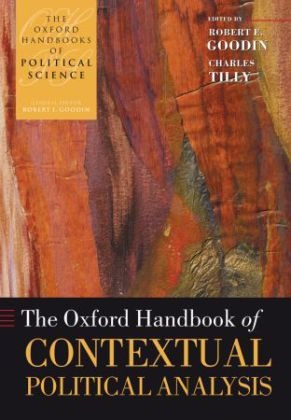Ulteriori informazioni
Zusatztext Goodin and Tilly have arrayed an outstanding group of fifty-one authors...This is a marvellous handbook into which a researcher might dip and delve. Most of the chapters provide the background needed by the curious, and some are likely to be informative to those already well versed in the area. Taken together, they offer an extensive and well-reasoned check-list of all the dangers and adventures awaiting scholars bent on explanation. The best build on cutting edge work in which the authors themselves engage. Klappentext The Oxford Handbooks of Political Science is a ten-volume set of reference books offering authoritative and engaging critical overviews of the state of political science. This volume! The Oxford Handbook of Contextual Political Analysis! sets out to synthesize and critique for the first timethose approaches to political science that offer a more fine-grained qualitative analysis of the political world. The work in the volume has a common aim in being sensitive to the thoughts of contextual nuances that disappear from large-scale quantitative modelling or explanations based on abstract! general! universal laws of human behavior. It shows that "context matters" in a great many ways: philosophical context matters; psychological context matters; cultural and historical contexts matter; place! population! and technology all matter. By showcasing scholars who specialize in the analysisof all these contexts side-by-side! the Oxford Handbook of Contextual Political Analysis shows how political scientists can take those crucial contextual factors systematically into account. Zusammenfassung Oxford Handbooks of Political Science are the essential guide to the state of political science today. With engaging contributions from 51 major international scholars, the Oxford Handbook of Contextual Political Analysis provides the key point of reference for anyone working in political science and beyond.
Sommario
- Part I. Introduction
- 1: Charles Tilly and Robert E. Goodin: It Depends
- Part II. Philosophy Matters
- 2: Philip Pettit: Why and How Philosophy Matters
- 3: Louise Antony: The Socialization of Epistemology
- 4: Colin Hay: Political Ontology
- 5: James N. Druckman and Arthur Lupia: Mind, Will, and Choice
- 6: Rod Aya: Theory, Fact, Logic
- Part III. Psychology Matters
- 7: Kathleen M. McGraw: Why and How Psychology Matters
- 8: James M. Jasper: Motivation and Emotion
- 9: Samuel Bowles and Herbert Gintis: Social Preferences, Homo Economicus, and Zoon Politikon
- 10: Francesca Polletta and M. Kai Ho: Frames and Their Consequences
- 11: Aleida Assmann: Memory, Individual and Collective
- Part IV. Ideas Matter
- 12: Dietrich Rueschemeyer: Why and How Ideas Matter
- 13: Richard Price: Detecting Ideas and Their Effects
- 14: Neta C. Crawford: How Previous Ideas Affect Later Ideas
- 15: Jennifer L. Hochschild: How Ideas Affect Actions
- 16: Lee Clarke: Mistaken Ideas and Their Effects
- Part V. Culture Matters
- 17: Michael Thompson, Marco Verweij, and Richard J. Ellis: Why And How Culture Matters
- 18: Pamela Ballinger: How to Detect Culture and its Effects
- 19: Courtney Jung: Race, Ethnicity, Religion
- 20: Susan Gal: Language, Its Stakes and Its Effects
- 21: Paul Lichterman and Daniel Cefaï: The Idea of Political Culture
- Part VI. History Matters
- 22: Charles Tilly: Why and How History Matters
- 23: Roberto Franzosi: Historical Knowledge and Evidence
- 24: James Mahoney and Daniel Schensul: Historical Context and Path Dependence
- 25: Ruth Berins Collier and Sebastián Mazzuca: Does History Repeat?
- 26: Patrick Thaddeus Jackson: The Present as History
- Part VII. Place Matters
- 27: Göran Therborn: Why and How Place Matters
- 28: R. Bin Wong: Detecting the Significance of Place
- 29: Nigel J. Thrift: Space, Place, and Time
- 30: Javier Auyero: Spaces and Places as Sites and Objects of Politics
- 31: Don Kalb: Uses of Local Knowledge
- Part VIII. Population Matters
- 32: David Levine: Why and How Population Matters
- 33: Bruce Curtis: The Politics of Demography
- 34: Gary P. Freeman: Politics and Mass Immigration
- 35: Jeffrey Herbst: Population Change, Urbanization, and Political Consolidation
- 36: David I. Kertzer and Dominique Arel: Population Composition as an Object of Political Struggle
- Part IX. Technology Matters
- 37: Wiebe E. Bijker: Why and How Technology Ma
Relazione
Spanning all of the major substantive areas and approaches in modern political science, this blockbuster set is a must-have for scholars and students alike. Each volume is crafted by a distinguished set of editors who have assembled critical, comprehensive, essays to survey accumulated knowledge and emerging issues in the study of politics. These volumes will help to shape the discipline for many years to come. Theda Skocpol, Victor S. Thomas Professor of Government and Sociology, and Dean of the Graduate School of Arts and Sciences, Harvard University

